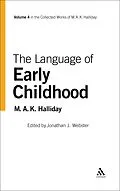For nearly half a century, Professor M. A. K. Halliday has been enriching the discipline of linguistics with his keen insights into the social semiotic phenomenon we call language. This ten-volume series presents the seminal works of Professor Halliday. This fourth volume contains sixteen papers that look at the development of early childhood language. They are presented in three parts: infancy and protolanguage; the transition from child tongue to mother tongue; and early language and learning. The sociolinguistic account of the early development of the mother tongue presented by Professor Halliday is based on his intensive study of the language of one particular child, Nigel, for the period from nine- to eighteen months.
Autorentext
M.A.K. Halliday was Emeritus Professor of Linguistics at the University of Sydney.
Inhalt
Part 1 Infancy and protolanguage
Editor's Introduction
1 Representing the child as semiotic being: meaning and moving in the earliest months of life
2 Learning how to mean
3 Early language learning: a sociolinguistic approach
4 A sociosemiotic perspective on language development
5 One child's protolanguage
6 Meaning and the construction of reality in early childhood
7 The ontogenesis of dialogue
Part 2 Transition from child tongue to mother tongue
Editor's Introduction
8 Into the adult language
9 On the development of texture in child language
10 The contribution of developmental linguistics to the interpretation of language as a system
11 On the transition from child tongue to mother tongue
12 Language as code and language as behaviour: a systemic-functional interpretation of the nature and ontogenesis of dialogue
13 The place of dialogue in childen's construction of meaning
Part 3 Early language and learning
Editor's Introduction
14 Relevant models of language
15 The social context of language development
16 Three aspects of children's language development: learning language, learning through language, learning about language
17 Towards a language-based theory of learning
18 Grammar and the construction of educational knowledge
